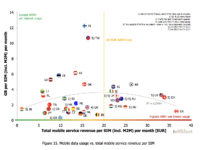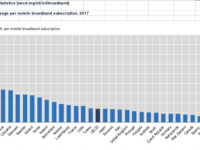Tefficient has released a new report on global wireless market that makes it clear that Canada is a global outlier (or leader if you are a telecom executive). Simply put, no one has carriers that generate more revenue with less usage per SIM than Canada.
Post Tagged with: "crtc"
The Consequences of High Wireless Costs: OECD Data Confirms Canadians Lag Behind in Data Usage
The OECD released the latest data on broadband usage this week highlighting yet again that the high costs of Canadian wireless services have real world consequences when it comes to consumer data usage. Earlier this month, Canadian Wireless Telecommunications Association President Robert Ghiz told an industry conference:
Consumption of mobile data – through all kinds of apps and every flavour of streaming content – continues to grow at an astounding rate in Canada. Mobile data traffic in our country increased by 41% between 2015 and 2016 alone.
Yet the OECD comparative data tells a far different story. First, OECD data indicates that Canada is at the low end of countries when measured by mobile broadband subscriptions per 100 inhabitants, ranking well below the OECD average and ahead of only six other OECD countries.
How Did George Brown College Come to Support the FairPlay Site Blocking Plan? Docs Show Bell Lobbied the School’s President
How did George Brown College President Anne Sado come to write a letter in support of the Bell coalition website blocking plan? Given the prior reports on Bell’s internal astroturfing campaign and the pressure on a Brock University executive (subsequently distanced by the University) it will come as little surprise to learn that the origins stem from direct Bell lobbying. According to documents obtained under provincial access to information laws, Mark Milliere, TSN’s Senior Vice President and General Manager (part of Bell Media) relied on the same playbook as with Brock University, citing its support for the college and urging it to write in support to the CRTC. The request included sample letters from Brock and Ryerson University (more on Ryerson in a forthcoming post).
CRTC Rebuked: Government Signals Frustration With the Commission Prioritizing Carriers Over Consumers
Telecom issues were in the spotlight yesterday with the government ordering the CRTC to “examine claims of aggressive or misleading sales practices concerning telecommunications services, the prevalence and impact on consumers, as well as potential solutions.” The Order-in-Council, which was accompanied by a request to the Competition Bureau to provide assistance, follows CBC reports on misleading sales tactics from companies such as Bell and Rogers and the CRTC’s rejection of a request to conduct an inquiry into the matter. The announcement from Innovation, Science and Economic Development Minister Navdeep Bains is a welcome development, signalling the government’s frustration with a CRTC under new chair Ian Scott that has seemingly abandoned consumer interests.
The CRTC’s Fundamental Flaw: Broadcasting May Be the Internet, but the Internet is Not Broadcasting
Canada’s communications regulator last week reversed decades of policy by recommending that the government implement new regulation and taxation for internet services in order to support the creation of Canadian content. The report on the future of program distribution, which will surely influence the newly established government panel reviewing Canada’s telecommunications and broadcasting laws, envisions new fees attached to virtually anything related to the internet: internet service providers, internet video services, and internet audio services (wherever located) to name a few.
My Globe and Mail op-ed notes with the remarkable popularity of services such as Netflix and YouTube, there is a widely held view that the internet has largely replaced the conventional broadcast system. Industry data suggests the business of broadcasters and broadcast distributors such as cable and satellite companies won’t end anytime soon, but it is undeniable that a growing number of Canadians access broadcast content through the internet.











